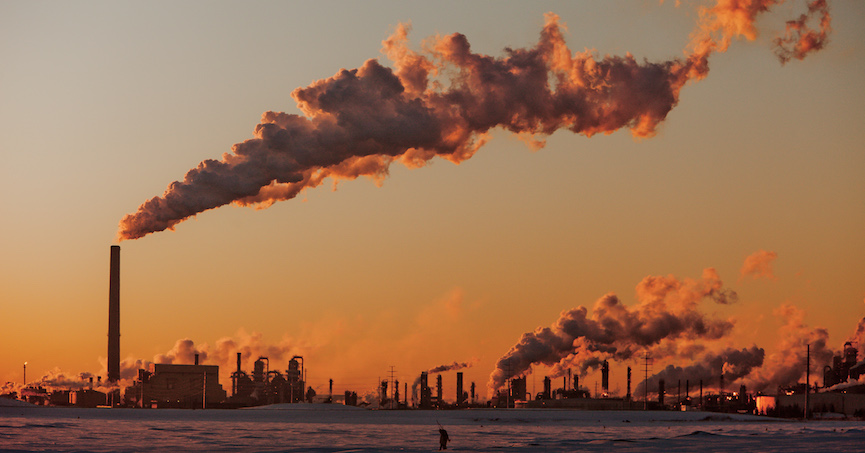If the early speculation is right, the Liberals under Justin Trudeau will win a second majority government on October 21, 2019, just a little over 10 months from now.
That’s not a great sign that there will be meaningful action anytime soon without extra-parliamentary pressure to make it happen.
To date, the Liberals have promised – notably under the 2015 Paris climate agreement — to reduce carbon emissions by 30 per cent below 2005 levels by 2030.
More specifically, this means the Trudeau government has pledged to reduce emissions from 747 megatonnes (the 2005 level) to 523 megatonnes by 2030.
Now, the United Nations Intergovernmental Panel on Climate Change (IPCC) says carbon emissions must be cut by 45 per cent from 2010 levels by 2030 to keep global warming from rising about the critical 1.5 degrees Celsius (C) mark.
Canada’s carbon emissions in 2010 were 692 megatonnes, meaning this country would have to cut emissions down to about 380 megatonnes by 2030.
In March 2017, Environment Canada stated projected that Canada would emit between 697 and 790 megatonnes of carbon emissions in 2030.
As such, the Trudeau government is neither on track to meet its commitment under the Paris climate agreement nor the target that the IPCC now says is needed.
That’s likely in part because last year Trudeau told an conference of oil industry insiders in Houston that, “No country would find 173 billion barrels of oil in the ground and leave them there.” But that’s precisely what needs to be done to limit global warming to below the 1.5 C mark.
A recent report by Environmental Defence and Stand Earth also found that oil and gas companies will have an average of 80 per cent of their emissions exempt from the carbon tax, which is already insufficient to meet the target pledged in the Paris agreement.
What about the other federal parties?
This October, Conservative Party leader Andrew Scheer stated that his party would release their climate plan “very soon”, but would not commit to doing so before the end of 2018, only at some point prior to the October 2019 election.
Notably, the Trudeau government adopted the Harper Conservative government’s target of a 30 per cent reduction below 2005 levels by 2030.
In 2017, Jagmeet Singh pledged that an NDP government would reduce carbon emissions by 30 per cent below 2005 levels by 2025 (five years earlier than Trudeau’s promise of 2030), but that would still get us to just 523 megatonnes rather than 380 megatonnes.
And in 2015, the Green Party promised to cut carbon emissions by at least 40 per cent below 2005 levels by 2025 and to achieve carbon neutrality by 2050. That 40 per cent reduction would get us to 448 megatonnes (the deepest promised cut, but still higher than 380 megatonnes).
In 2015, Gordon Laxer made the case that the tar sands could be phased out over a 15 year period, at that point meaning by 2030.
Is any federal party willing to commit to this in the upcoming election?
Currently, the tar sands are responsible for about 70 megatonnes of upstream carbon pollution a year and NDP Premier Rachel Notley’s “climate leadership plan” announced in November 2015 would cap those emissions at 100 megatonnes a year (a more than 40 per cent increase that is expected to be reached by 2030).
A recent report by the Canadian Centre for Policy Alternatives and the Parkland Institute found that five corporations (Suncor, CNRL, Cenovus, Imperial and Husky) control 79.3 per cent of Canada’s productive capacity of bitumen (2.86 million barrels per day) and that their aggregate gross profit was $46.6 billion in 2017.
Radical labour activist Lucy Parsons (1853-1942) once commented, “Never be deceived that the rich will let you vote away their wealth.”
A present-day Parsons might say, “Never be deceived that Big Oil will let you vote away the billions of dollars in profits they see in the ground and under the sea.”
It remains to be seen if any major political party in Canada will step up to the urgency of the political moment and put forward an election platform that declares a climate emergency, pledges to phase out the tar sands and put an end to the Trans Mountain pipeline, opposes the construction of new refineries, and that rapidly moves us toward a 100 per cent clean energy economy.
Brent Patterson is a political activist and writer.
Image: kris krug/Flickr
Help make rabble sustainable. Please consider supporting our work with a monthly donation. Support rabble.ca today for as little as $1 per month!



